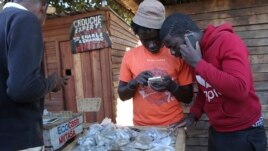13 October, 2019
When going to a store, Isaiah Macheku prepares for shock.
Hyperinflation is changing prices so quickly in Zimbabwe that the price you see on a store's window might change by the time you try to pay.
"It is a nightmare," Macheku said. "I can't plan."

In this photo taken Thursday, Aug. 8, 2019, vendors are seen on their mobile phones while selling cash in Harare, Zimbabwe. (AP Photo/Tsvangirayi Mukwazhi)
Before Robert Mugabe was forced to resign as president in late 2017, Macheku earned about $24 from his wages. He says that was enough money to pay for everything his family needed. Now the same amount can hardly buy 4 kilograms of meat.
Macheku finally decided to buy chicken skin for his family's dinner. It is the closest his family gets to eating meat.
The International Money Fund (IMF) estimates that Zimbabwe has the second highest inflation in the world, after Venezuela. The southern African nation had high inflation 10 years ago, but hyperinflation is destructive.
Zimbabwe's economy has been shrinking for more than a year.
"Anyone who thinks a solution is in sight must be very brave," said economist John Robertson. "Government officials don't want to admit the real causes and don't want to fix the real problems." He said the real causes include the government spending more money than it has.
When going to stores, money alone is not enough. Notebooks, electronic calculators and mobile phones have become important tools. In one nearly empty market, there were more people taking pictures of the prices than those buying products.
"I sent the pictures to my husband. We have to decide fast before the prices go up again," said Marianne Hove.
Others did quick price estimates and called home to ask which products to buy.
In other businesses, prices are only available when shoppers line up to pay.
Store owners said they would go out of business if they left prices unchanged.
"It is becoming increasingly impossible to... price goods," said Denford Muntashu, president of the Confederation of Zimbabwe Retailers. The situation is "synonymous with hyperinflation," although the government has stopped publishing inflation numbers, he added.
Some businesses are closing while others are limiting what they sell to reduce risk, he said.
Prices in Zimbabwe are changing faster than at any point in the past 10 years.
In 2009, the value of the country's currency collapsed under the weight of hyperinflation. The government then approved a multi-currency system, based mainly on the United States dollar.
This year Zimbabwe's government made use of dollars and other foreign monies illegal. The local currency has been dropping in value. There is "high inflation, which reached almost 300 percent in August," the IMF reported last month.
Low public trust in the government, policy uncertainty and the misuse of foreign currency are putting pressure on the exchange rate, the IMF said. It added that a lack of rainfall and foreign debt are limiting Zimbabwe's ability to interest foreign investors.
Most businesses import products because of the collapse of local industry. Foreign currency shortages and the sharp drop in the local currency's value are hard on Zimbabwe's citizens and businesses.
President Mnangagwa continues to appeal for more time.
"Getting the economy working again from being dead will require time, (and) patience," he said in a state of the nation speech on October 1.
Like Mugabe, the president largely blames U.S. government sanctions for the crisis. U.S. officials say the sanctions don't target Zimbabwe's government, but, rather, some officials, including the president himself, over charges of human rights abuses.
"We cannot continue to live like this. Why did they remove Mugabe if they had no solutions?" asked one man.
I'm Susan Shand.
The Associated Press reported this story. Susan Shand adapted it for VOA Learning English. George Grow was the editor.
Write to us in the Comments Section or on 51VOA.COM.
_________________________________________________________________
Words in This Story
hyperinflation – n. extremely sudden increase in the price of goods and service
nightmare – n. a very bad or frightening experience or situation
calculator – n. a device used to answer mathematical questions
synonymous – adj. having the same meaning
currency – n. the money that a country use
uncertainty – adj. the state of being unsure
sanctions – n. an order that is given to force a country to obey international laws by limiting or stopping trade with that country